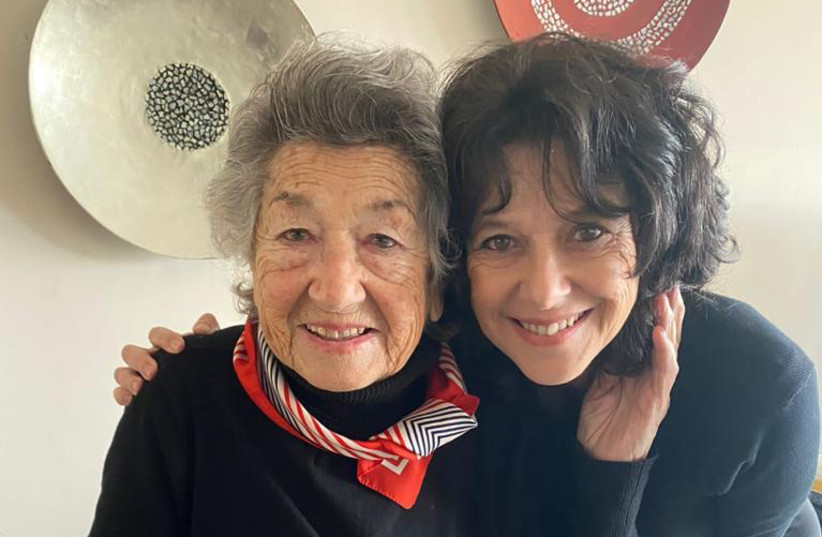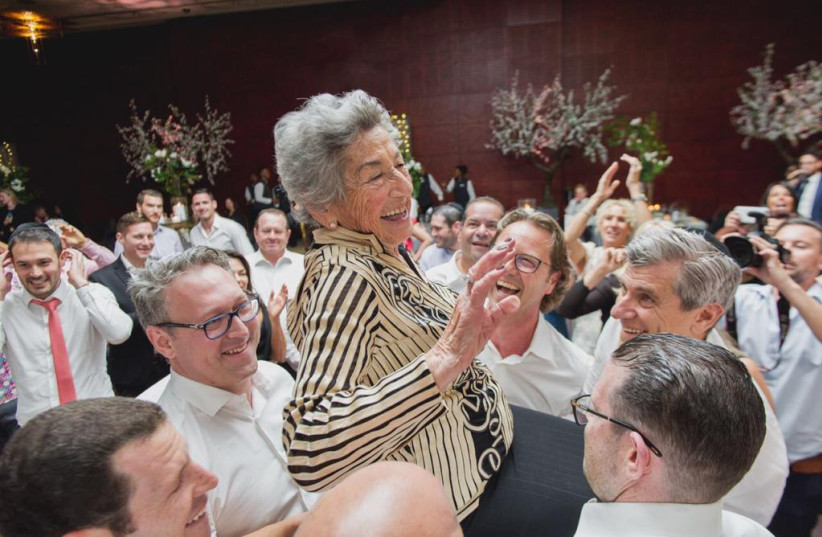Recently a friend sent me a video link and texted: “Did you know this woman in South Africa?”
I opened the link that read: “I Am Here. Coming to cinemas on March 11. A life-affirming documentary that celebrates the remarkable life of Ella Blumenthal, whose magnetic personality and spirit has remained undimmed despite living through one of history’s darkest chapters. One of the oldest living survivors of the Holocaust.”
Despite growing up in Johannesburg, I had never heard of Ella Blumenthal, who was born on July 25, 1921, in Warsaw.
After watching the film, I was so inspired that I decided that I wanted to express my appreciation and admiration for her. Fortunately the sprightly Mrs. Blumenthal is an avid Facebook user, and within a couple of days I received a message from her thanking me for my kind words. I then decided that I had to write about this amazing centenarian who is worthy of the title: National Treasure of the Jewish People. I requested an interview and soon heard from her daughter, Evelyn Kaplan in Cape Town. Apparently, I was not the only one that was eager to write about her. The film has attracted so much attention around the world that I had to wait a few days before I could interview Ella on Zoom.
The daughter of a textile merchant, Ella was the youngest of seven children. In 1940 at age 20, she and her family were herded into the Warsaw Ghetto where at its height, 460,000 Jews where crammed into 3.4 square kilometers.

It seems that from the very start of her adult life, Ella displayed traits of defiance and a determined spirit. She assisted an underground group to distribute leaflets that read:
“Citizens, Jews, awaken from your lethargy, stand up to fight. Do not believe that they are sending us to labor camps. It is a vicious lie. Our brothers and sisters are being brutally murdered in the death camp Treblinka. Brothers, prepare to defend yourselves. Those who are not fit for fighting should go underground and hide in cellars and bunkers. Turn every building into a fortress. We have no right to occupy the surface of the earth, because we are condemned to death
By the time of the Warsaw Ghetto Uprising, only two members of Blumenthal’s family were left – her father and her niece Roma Rothstein. From April 19 to May 16, 1943, Ella took part in the uprising. After it was crushed, she and those that survived were transported to the Majdanek and Treblinka death camps. Between 1943 and 1945, Blumenthal was incarcerated in three concentration camps: Majdanek, Auschwitz and Bergen-Belsen. In Majdanek, her father was murdered in the gas chambers with most of the older prisoners. Ella and Roma were also sent to the gas chambers, but by a quirk of fate, 700 women had been assigned to be gassed when the quota only called for 500.
“An order was received to gas 500 Jewish women, not 700 as we were,” Blumenthal reported in her testimony. “We were told that the correct transport of 500 to be gassed would be arriving in the morning and we would be sent to another camp. At dawn when we were chased out, there was a contingent of women coming off the cattle trucks, and they were led straight to the gas chamber that we had just left. ‘Ordnung muss sein!’ There must be order. Due to German orderliness and the irony of fate, we evaded the Angel of Death.”
Not long after, Ella and her niece Roma, who was just five years younger, were sent to Auschwitz. While there Roma contracted typhus and was moved to the camp “hospital.” On her third day there, one of the doctors warned her that all the remaining patients were being sent to the gas chambers. Roma, who was not able to walk, crawled out of the hospital and managed to survive. Ella too contracted typhus. Knowing full well what would happen to her if she went to the hospital, she decided to hide in the blockhouses and the toilet.
“Things got so bad,” she said, “that at one point Roma begged me to come with her to the electrified fence that surrounded Birkenau to commit suicide. I told her that I wanted to live and managed to persuade her not to do it by telling her that tomorrow was another day and that things could get better.”
Ella and Roma were subsequently moved to Bergen-Belsen in November 1944.
“We were the lucky ones,” she told me during our interview. “We were alive among the living dead.” On April 15, 1945, the two women were liberated by the British army. When the war ended, Blumenthal managed to get to Warsaw in the hope of finding family members who had survived. She found out that Roma Rothstein’s father had survived and was in Tel Aviv. Through his contacts in Palestine, he managed to arrange for Ella and his daughter to get to Paris. From there he got them visas to join him in Palestine. Roma, meanwhile, met someone in Paris. They got married and decided to emigrate to the United States.
“I came to Palestine under an assumed name,” she told me proudly. “I came with a visa registered to Rothstein.”
Ella arrived in Tel Aviv in 1947. There she met a fellow by the name of Isaac Blumenthal. “He and I used to take walks on the old Tel Aviv promenade,” she recounted. “He was a nice man, and during our walks, we really got to know each other.” I asked her whether he knew about her experiences in the camps. “He had fought with the allied army in Egypt and had sisters living in Palestine. He had come to Palestine from Johannesburg to visit his sisters and to pay respects to his mother’s grave in Palestine. They were from Liebau, in Latvia, originally. When he told them that he had met me, a survivor, they warned him not to get involved and not to marry me. He ignored their advice and 13 days later we were married.”
I asked Ella what memories she had of Palestine in 1947.
“I lived in Tel Aviv in an apartment with other young Jewish women who had survived the Holocaust. I worked in my uncle’s clothing shop near Allenby Street. It was during the time of the British Mandate. I remember once being introduced to a chap by the name of Mulka. We used to go out for coffee and chat. I remember my roommates warning me to be careful. They told me that the British police were looking for him!
“Things were very difficult during those times. I remember that after we got married, I had to travel to Jerusalem to the British High Commission to register and get papers that would allow me to accompany my husband to South Africa. We traveled in a convoy and were constantly shot at from above as we ascended the hills to Jerusalem.”
I asked her how she got to South Africa. “My husband went ahead of me. I had to get inoculated. This delayed my departure by a week. His family had prepared a wedding party for us and sadly I could not get there in time. I first had to fly via a Swiss airline to get a connecting flight via Khartoum in Sudan, where we spent the night in the most extraordinary hotel,” she recounted excitedly. “In the end, I arrived at Germiston airport, and he was the only person there to meet me.”
Once again I was amazed at Ella’s incredible memory and her ability to express herself. She speaks with a wonderful Yiddish South African accent and exudes charisma. At age 100, she still a very attractive lady, impeccably groomed and incredibly self-assured. I asked her what it was like when she came to South Africa.
“Well,” she told me, “I had been living in Paris and so Johannesburg was a little disappointing compared to what my life had been like in France. As far as the Holocaust was concerned, I was determined not to allow it to overshadow me. I knew I had to put my past behind me and work on making a fresh start and a new beginning.”
She went on to me about life in Johannesburg. “I was somewhat handicapped by my lack of English,” she smiled mischievously. “Do you want to laugh, Robert?” I nodded. “So let me tell you about my one of memories of being in Johannesburg those early days. My husband told me to improve my English. He told me to take the trolley bus and make my way to one of the suburbs to have elocution lessons. I found my way to Eloff Street in the city center and took the No. 4 bus to Yeoville, where I got out and walked to Francis Street where the elocution teacher lived.”
I was fascinated by the way Ella recounted the details without a flicker of hesitation and with the cheekiest expression on her face. “The teacher was not happy about the way I pronounced my ‘o’s. I pronounced them the Polish way, and she wanted me to pronounce them the English way. She gave me homework. I had to hold up a mirror and repeat several times: Oh No Rose, Don’t Go Home Alone!”
We both laughed as Ella’s enchanting personality took over. What started as a serious interview about the Holocaust turned into an uplifting and inspiring conversation with a 100-year-old feisty Jewish matriarch: Ella is the mother of four children, grandmother of 11, and great-grandmother of nine.
We ended the interview with Ella expressing her sincerest wish that the war in Ukraine would come to an end. I was enthralled by her, and tried to fathom how this incredible lady was able to muster the strength and fortitude to get through all that she had experienced. The answer was probably provided by her daughter Evelyn who told me how, before the pandemic, Ella had lived independently in her own apartment in Sea Point.

“When corona began, she came to live with us in our apartment,” said Evelyn. “During the worst days of lockdown, after weeks and weeks of being self-isolated, I would get quite depressed and complain about what was going on in the world. Her response was: ‘No need to get depressed, just come on to the balcony and look at those beautiful Cape mountains and the magnificent blue Atlantic Ocean. Let’s be happy that we are alive and that we can enjoy these things.’”
The documentary I am Here about her life and experiences is a “must-see.” As Israel marked Holocaust Remembrance Day, I thought of Ella Blumenthal, the century-old Holocaust survivor with the indomitable spirit of a teenager who inspires everyone who meets her. ■
